
Sybille Maria Christina Schmitz was a German actress.
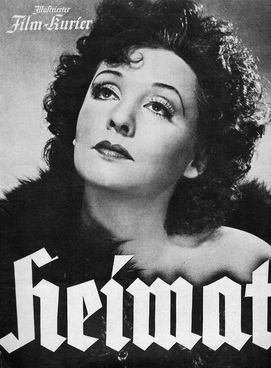
Heimat is a 1938 German historical drama film directed by Carl Froelich and starring Zarah Leander, Heinrich George and Ruth Hellberg. The film's melodramatic storyline portrays the return of a leading singer to her hometown, where her father wishes her to settle down and marry. It is based on the 1893 play Heimat by Hermann Sudermann.

Between Yesterday and Tomorrow is a 1947 German drama film directed by Harald Braun and starring Hildegard Knef, Winnie Markus and Sybille Schmitz.

Everything for Gloria is a 1941 German romantic comedy film directed by Carl Boese and starring Leo Slezak, Laura Solari and Johannes Riemann. The film was shot at the Cinecittà in Rome, and marked the German debut of the Italian actress Solari.

The Roundabouts of Handsome Karl is a 1938 German comedy film directed by Carl Froelich and starring Heinz Rühmann, Karin Hardt, and Sybille Schmitz. It portrays the experiences of a young waiter during the Great Depression.

All Because of the Dog is a 1935 German comedy film directed by Fred Sauer and starring Weiß Ferdl, Julia Serda and Edith Oß. Location shooting took place around Munich and Tegernsee. The film's sets were designed by the art directors Otto Guelstorff and Hans Minzloff.

Operetta is a 1940 German musical film directed by Willi Forst and starring Forst, Maria Holst and Dora Komar. The film was made by Wien-Film, a Vienna-based company set up after Austria had been incorporated into Greater Germany following the 1938 Anschluss. It is the first film in director Willi Forst's "Viennese Trilogy" followed by Vienna Blood (1942) and Viennese Girls (1945). The film portrays the life of Franz Jauner (1832–1900), a leading musical figure in the city. It is both an operetta film and a Wiener Film.

Wenn die Musik nicht wär is a 1935 German drama film directed by Carmine Gallone and starring Paul Hörbiger, Willi Schaeffers and Ida Wüst. The film was shot at the Grunewald Studios in Berlin. It is based on the novel Der Kraft-Mayr by Ernst von Wolzogen. The film's art direction was by Fritz Maurischat and Karl Weber.

Sensation in Savoy is a 1950 West German comedy crime film directed by Eduard von Borsody and starring Sybille Schmitz, Paul Klinger, and Karl Schönböck.

Sergeant Schwenke is a 1935 German crime drama film directed by Carl Froelich and starring Gustav Fröhlich, Marianne Hoppe and Karl Dannemann. It was made at the former National Studios in Berlin's Tempelhof area which were now controlled by Froelich. The film's sets were designed by the art directors Franz Schroedter and Walter Haag. It is based on a novel of the same title by Hans Joachim Freiherr von Reizenstein. It was remade in 1955 as Sergeant Borck..
The King of Paris is a 1930 German comedy film directed by Leo Mittler and starring Iván Petrovich, Hanna Ralph and Hans Peppler. Leo Mittler also directed a separate French-language The King of Paris.
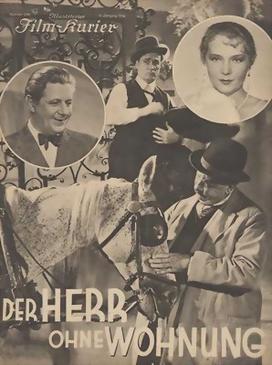
The Gentleman Without a Residence is a 1934 Austrian comedy film directed by E. W. Emo and starring Paul Hörbiger, Hilde von Stolz, and Hermann Thimig. The film's sets were designed by the art director Julius von Borsody.
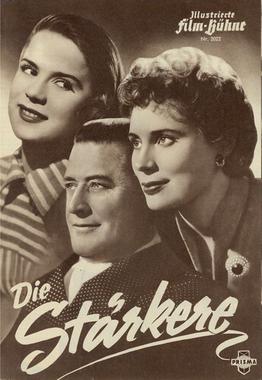
The Stronger Woman is a 1953 West German drama film directed by Wolfgang Liebeneiner and starring Gertrud Kückelmann, Hans Söhnker and Antje Weisgerber. It was shot at the Tempelhof Studios in West Berlin and on location at the Schloss Büdingen. The film's sets were designed by the art directors Emil Hasler and Walter Kutz.
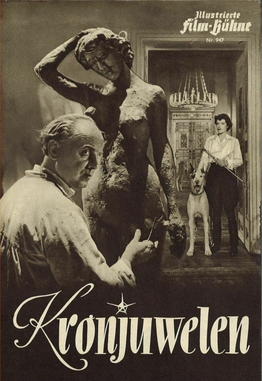
Crown Jewels is a 1950 West German crime film directed by Franz Cap and starring Sybille Schmitz, Hans Nielsen and Kurt Kreuger.
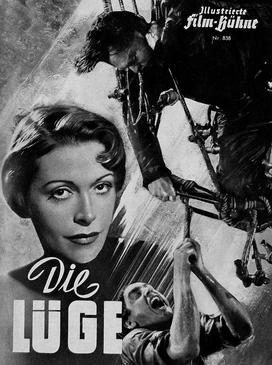
The Lie is a 1950 West German crime film directed by Gustav Fröhlich and starring Otto Gebühr, Sybille Schmitz and Cornell Borchers. It was shot at the Bendestorf Studios. Location shooting took place around Hamburg and Westerland. The film's sets were designed by the art director Franz Schroedter.

Hotel Sacher is a 1939 German drama film directed by Erich Engel and starring Sybille Schmitz, Willy Birgel, and Wolf Albach-Retty.

Woman Without a Past is a 1939 German drama film directed by Nunzio Malasomma and starring Sybille Schmitz, Albrecht Schoenhals, and Maria von Tasnady. It was shot at the Grunewald and Johannisthal Studios in Berlin. The film's sets were designed by the art director Hans Ledersteger.
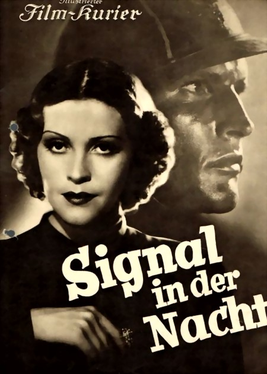
Signal in the Night is a 1937 German war drama film directed by Richard Schneider-Edenkoben and starring Sybille Schmitz, Inge List and Hannes Stelzer. Location shooting took place at Grünwald Castle and around Bad Reichenhall in Bavaria.

Farewell Waltz is a 1934 German historical musical drama film directed by Géza von Bolváry and starring Wolfgang Liebeneiner, Richard Romanowsky and Hanna Waag. It is based on the life of the composer Frédéric Chopin.
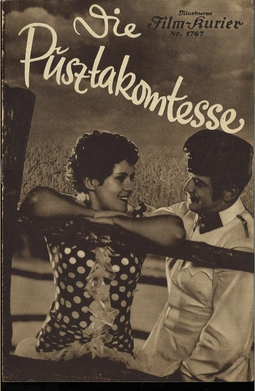
Dreams of Love is a 1935 historical biographical drama film directed by Heinz Hille and starring Franz Herterich, Walter Steinbeck and Olga Chekhova. It was a co-production between German, Austria and Hungary, and was released as Die Pusztakomtesse in Austria. It was shot at the Hunnia Studios in Budapest and on location in Tata. The film's sets were designed by the art director Márton Vincze. Hille also directed a separate Hungarian-language version Dream Love with a different cast.



















